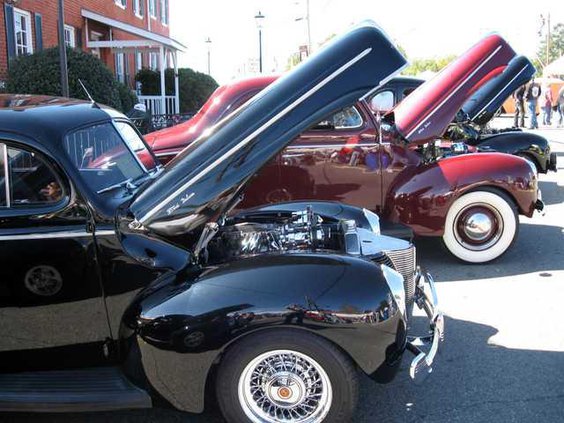43rd Annual Moonshine Festival
When: Friday-Sunday
Where: downtown Dawsonville
For info on Kare for Kids, the charity supported by the Moonshine Festival, click here
Cars and booze make for a dangerous combination, but in Dawsonville they offer up big reasons for celebration.
The 43rd annual Moonshine Festival kicks off Friday morning with a "Moonshine Run" of vintage cars traveling the winding mountain roads from Dawsonville to Blairsville for a barbeque lunchtime celebration at Vogel State Park. Then it's back for the Cruise-In car show and celebration outside the Georgia Racing Hall of Fame. The evening concludes with a banquet and ceremony inside the Hall in recognition of the 2010 inductees.
The rest of the weekend includes music, games, food, arts and crafts, swap meets, moonshine history and lots and lots of cars.
Known as the "Moonshine Capital of the World," Dawsonville's rich history of moonshine-running gave birth to the massive phenomenon that is NASCAR, and the old-timers who once were considered outlaws now hold their heads high knowing they played an important part in American culture.
"This part of the country was settled by Scottish people and they brought their whiskey stills with them. ... Up here in the mountain area they just couldn't plant farmland like they could in the South," former moonshine runner and longtime festival organizer Gordon Pirkle explains of the region's tradition of whiskey-making.
Prohibition seriously challenged the moonshiners' livelihoods and although the federal government ended it in 1933, the heyday of moonshine-running in north Georgia happened in the 1940s and 50s.
"Here in the South it went on a lot longer than that-it's the Bible Belt down here," says Pirkle, "Very few changed over to wet counties even after the war- after prohibition the fast cars came along and they adapted."
He noted that moonshine-running was a common practice up until the 1960s when blue laws began to change and the Cuban embargo led the cost of sugar to soar, causing homemade moonshine to cost more to make and run than legal, taxed liquor was to buy.
In the meantime, a new culture of stock car racing had been born. As Ford introduced its large, fast models of the late 1930s and early ‘40s, moonshine runners embraced the vehicles. The so-called 40 Fords became "notorious for hauling liquor-they had big trunks and large V-8 engines," explains Calvin Byrd, festival organizer and president of Kare for Kids, the Moonshine Festival's charity cause.
"The moonshine runners had faster cars than the police and they were able to outrun them, some would soup them up."
The lifestyle certainly provided plenty of thrills. When drivers weren't running moonshine, they turned to racing.
"On Sundays they'd go out to the river bottoms and run ‘em and start betting money on it," Byrd said. "The right people came along and saw that there was money in it and they started organizing races."
The first organized stock car race took place on a horse track at Lakewood Fairgrounds outside of Atlanta and was won by Dawsonville native "Lightning" Lloyd Seay. The National Association for Stock Car Auto Racing-better known as NASCAR-formed in 1947 and Dawsonville drivers dominated the sport during its early years.
Although the festival will include several moonshine stills on display, plenty of kitschy souvenirs recalling the region's moonshining past, and a few old timers on hand to recount tales of running white lightnin' back in the day, the focus of the Moonshine Festival is really on cars.
"We're not really celebrating alcohol so much as we're celebrating what it led into-the 100 million dollar industry of NASCAR," said Pirkle.
Throughout the weekend, the streets of Dawsonville will be lined with more than 500 vintage automobiles including the largest gathering of 40 Fords in the South. NASCAR Hall of Famer David Pearson, the second winningest driver in NASCAR history, serves as grand marshal of the Saturday morning parade and the entire weekend is something of a reunion for legendary drivers from throughout the decades.
Sure the moniker may be misleading, but it certainly brings in the crowds. Like most mountain towns, Dawsonville has been holding a fall festival for nearly half a century, but about 25 years ago, they decided to officially designate it the "Moonshine Festival" in celebration of the town's notorious ties.
"You bet we caught hell ‘cause most people frowned on it-but the crowds started coming," recounts Pirkle. "You hand out a flyer that says ‘fall festival' and it wouldn't last to the next trash can, but if it says ‘moonshine' you bet they'll be there."
He noted festival crowds have soared from just a couple thousand before the rechristening to an estimated 110,000 last year.
Pirkle can be proud of the festival's success and today he is even prouder of his place in a thriving part of American culture.
"We was kinda looked down on as outlaws, but it was just a way of makin' a living. For it to have created such a great sport, I don't feel bad anymore."

